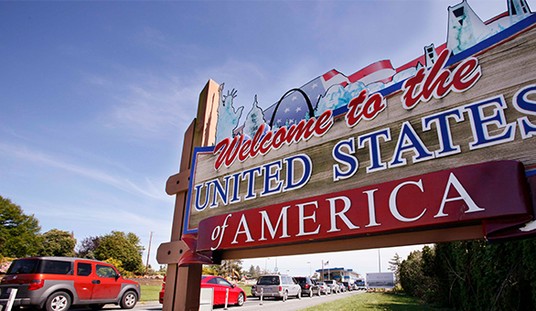On Tuesday, The Wall Street Journal reported that the Trump administration is proposing “extreme vetting” procedures which might include asking immigrants for their social media accounts and passwords, so as to access private messages. Extreme vetting procedures would also involve searching cell phones, and might apply to America’s closest allies, like Britain, Japan, and Australia.
Among other things, the tightened vetting might include asking “applicants for their social-media handles and passwords so that officials could see information posted privately in addition to public posts,” the Journal‘s Laura Meckler reported.
“We want to say for instance, ‘What sites do you visit? And give us your passwords,’ so that we can see what they do on the internet,” Homeland Security Secretary John Kelly said at a congressional hearing in February. “If they don’t want to give us that information then they don’t come.”
Another proposed change would be asking applicants to hand over their telephones so officials could examine their stored contacts and perhaps other information. While visitors have had their phones examined at ports of entry, that is not yet a routine request during the application stage. A senior official at the Department of Homeland Security (DHS) told the Journal their goal is to “figure out who you are communicating with.” The official added that “what you can get on the average person’s phone can be invaluable.”
The administration is also reportedly working to implement an idea Mr. Trump first articulated as a candidate last August — an “ideological test” to screen out people coming to the U.S. “Those who do not believe in our Constitution, or who support bigotry and hatred, will not be admitted for immigration into the country,” Trump declared.
The DHS official told the Journal that the questions being considered for the ideological test include whether visa applicants believe in “honor killings,” how they view the treatment of women in society, whether they value the sanctity of human life, and whom they view as a legitimate target in a military operation. The official insisted that the goal is not to filter out people with contrary thoughts but to screen out those who might act on them.
These changes might even apply to visitors from the 38 countries that participate in the Visa Waiver Program, the Journal reported. This program requires strict adherence to U.S. standards in data sharing, passport control, and other factors, and the select countries in it include some of America’s closest allies.
Such measures, the full scope of which have not yet been publicly discussed, would represent the “extreme vetting” President Trump has promised. The review was called for in the executive order Trump signed last month banning travel from six majority-Muslim countries. That order directed security officials to implement a vetting program which allows for “rigorous evaluation” of whether applicants support terrorism or present a risk of causing harm.
Although much of the order was put on hold by a federal judge in Hawaii, the work to enhance betting procedures was allowed to proceed.
While there might be a need for enhanced vetting measures, critics have attacked the proposed measures, both on civil libertarian grounds and on national security grounds.
A DHS inspector general’s report this year found that the agency didn’t properly measure the effectiveness of pilot programs which used social media in visa-application reviews, making it hard to determine if they should be expanded. Former DHS officials who worked on these issues in the Obama administration said that while the proposed practices might help, there are downsides to gleaning information from telephones and social media.
Such efforts, especially the social media hunt, would be time-consuming, the former DHS officials told the Journal that it could drive people with bad intentions to change their practices, avoiding detection.
“The real bad guys will get rid of their phones. They’ll show up with a clean phone,” Leon Rodriguez, the head of the U.S. Citizenship and Immigration Services until January who was heavily involved in refugee screening, told the Journal. “Over time, the utility of the exercise will diminish.”
Civil libertarians also opposed the phone and social media requirements. After DHS Secretary Kelly’s hearing in February, about 50 civil liberties groups said requiring passwords would be “a direct assault on fundamental rights,” and warned that foreign governments might also demand passwords from Americans.
The ideological test also inspired criticism. “It could deprive American citizens with the ability to interact and gain knowledge from the full spectrum of individuals and people who hold diverse beliefs world-wide,” Hugh Handeyside, a staff attorney with the ACLU’s National Security project, told the Journal.
“Our views and beliefs and opinions are protected,” Handeyside added. “Those same principles should drive our decisions about whether people would be permitted to visit the United States.”
While the ideological test might be understandable, the requirement of social media passwords might be too much. These new requirements remain in the proposal phase, so the Trump administration might actually use different — and more effective — screening techniques.
Some have suggested this story was “fake news.”
https://twitter.com/JackPosobiec/status/849301340316676096
Even if the Journal story is not entirely accurate, Kelly’s comments suggest that the administration is indeed considering asking for social media passwords, and that is indeed concerning.









Join the conversation as a VIP Member